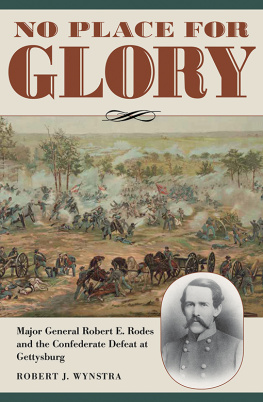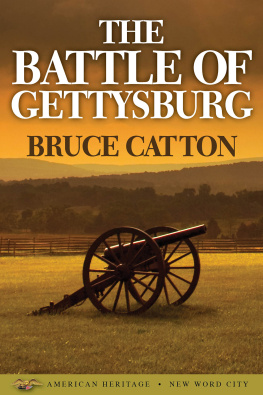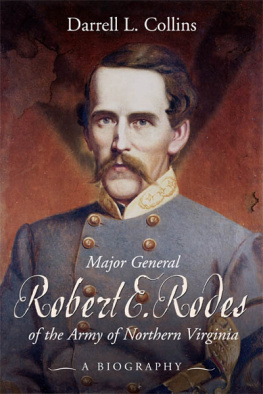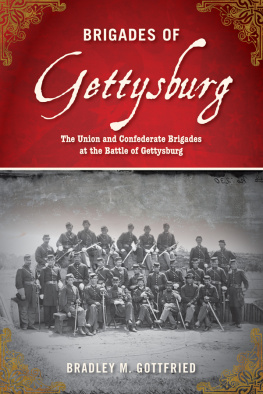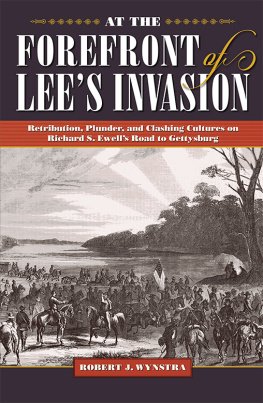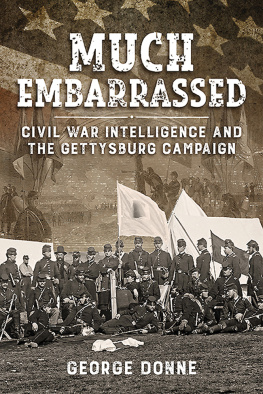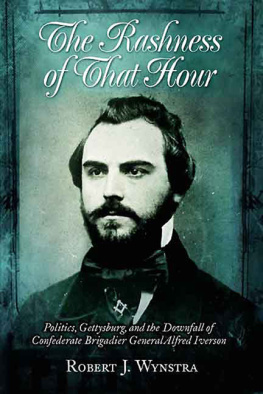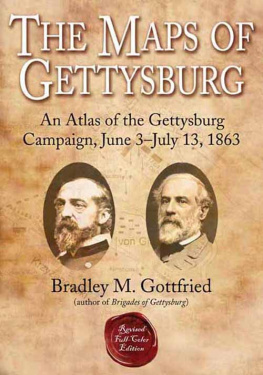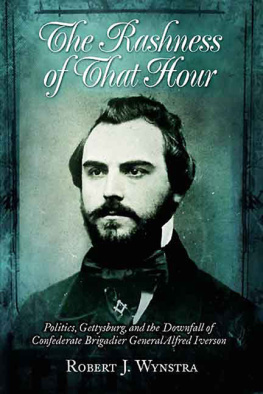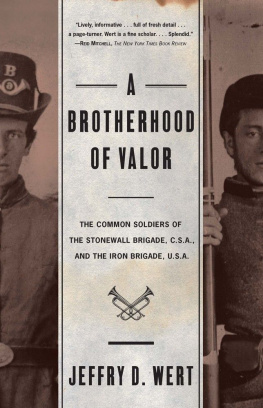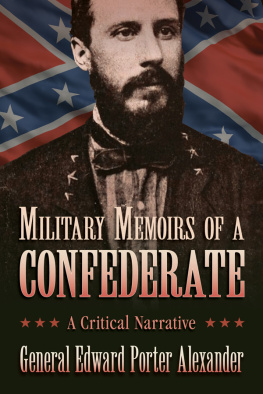No Place for Glory
CIVIL WAR SOLDIERS AND STRATEGIES
Brian S. Wills, Series Editor
Richmond Must Fall: The Richmond-Petersburg Campaign, October 1864
HAMPTON NEWSOME
Work for Giants: The Campaign and Battle of Tupelo/Harrisburg,
Mississippi, JuneJuly 1864
THOMAS E. PARSON
My Greatest Quarrel with Fortune:
Major General Lew Wallace in the West, 18611862
CHARLES G. BEEMER
Phantoms of the South Fork: Captain McNeill and His Rangers
STEVE FRENCH
At the Forefront of Lees Invasion: Retribution, Plunder, and Clashing Cultures on Richard S. Ewells Road to Gettysburg
ROBERT J. WYNSTRA
Meade: The Price of Command, 18631865
JOHN G. SELBY
James Riley Weavers Civil War: The Diary of a Union Cavalry
Officer and Prisoner of War, 18631865
EDITED BY JOHN T. SCHLOTTERBECK, WESLEY W. WILSON, MIDORI KAWAUE, AND HAROLD A. KLINGENSMITH
Blue-Blooded Cavalryman: Captain William Brooke Rawle in the Army of the Potomac, May 1863August 1865
EDITED BY J. GREGORY ACKEN
No Place for Glory: Major General Robert E. Rodes and the Confederate Defeat at Gettysburg
ROBERT J. WYNSTRA
2021 by The Kent State University Press, Kent, Ohio 44242
All rights reserved
ISBN 978-1-60635-410-0
Manufactured in the United States of America
No part of this book may be used or reproduced, in any manner whatsoever, without written permission from the Publisher, except in the case of short quotations in critical reviews or articles.
Cataloging information for this title is available at the Library of Congress.
25 24 23 22 21 5 4 3 2 1
O ver the years, many historians have cited Maj. Gen. Robert E. Rodes as probably the best division commander in Gen. Robert E. Lees vaunted Army of Northern Virginia. Despite those accolades, he faltered badly at Gettysburg, which stands as the only major blemish on his otherwise sterling record. Although his subordinates were guilty of significant blunders, Rodes shared the blame for the disjointed attack that led to the destruction of Brig. Gen. Alfred Iversons brigade along Oak Ridge on the first day of the battle. His lack of initiative on the following day was regarded by some top commanders as much worse. Whether justified or not, they directly faulted him for not supporting Maj. Gen. Jubal Earlys division in a night attack on Cemetery Hill that nearly succeeded in decisively turning the enemys flank.
The reasons behind Rodess flawed performance at Gettysburg have proved difficult to decipher with any certainty. The major writings on his career remain sparse, with only a single book-length study and two significant articles available in the existing literature. Author Darrell Collinss treatment of the generals actions in that battle is limited to a single chapter in his highly regarded biography. Historian Robert K. Krick has also contributed two thought-provoking essays of less than thirty pages each that provide valuable insights on Rodess complex character and relations with his brigade commanders. This, then, leaves an opening to explore his role in the defeat at Gettysburg in more depth.
The lack of a large body of personal correspondence has long hampered the search for suitable answers. To the regret of future historians, Rodess wife, Hortense, destroyed most of his letters and other personal papers in the years following his untimely death in 1864 at the Third Battle of Winchester, which has
Luckily the advent of the internet has provided access to a trove of previously underutilized primary sources. Of special importance are the many contemporary letters and postwar accounts that the rank-and-file soldiers published in their hometown newspapers. Other vital resources include the manuscript collections available from several small archives and local historical societies. With those new materials, it is now possible to develop a more detailed and nuanced understanding of his divisions activities during the Gettysburg Campaign from the men who served alongside the general. More important, those accounts shed light on the reasons behind Rodess missteps in the battle.
Although he had performed brilliantly while temporarily leading the division at Chancellorsville, Gettysburg marked Rodess first major action as its permanent commander. This time, however, he had to operate without the guiding hand of Lt. Gen. Thomas J. Stonewall Jackson. Rodes was further burdened with two of the weakest brigade commanders in Lees army. Both Iverson and Col. Edward A. ONeal would prove that his doubts about their abilities were well founded. While a third brigade commander would soon prove his merit, Brig. Gen. Junius Daniel was also new to the division. His troops only combat experience prior to Gettysburg had come during a brief stint a year earlier with the Army of Northern Virginia at Malvern Hill.
Often overlooked is how much Rodess ongoing disputes with Iverson and ONeal affected his performance on the battlefield. The general particularly had no love lost for ONeal, whom he regarded as little more than a political conniver. Rodes held the colonel in such low regard that he repeatedly interfered with the deployment of his troops on the field at Gettysburg, leaving ONeal severely shorthanded at a crucial point during the fighting on Oak Ridge. The colonel refused to take his commanders criticism lying down and enlisted some of his influential political allies to impugn Rodess character in the partisan press. Their feud went on for many months before Lee finally removed ONeal from the army.
Iverson was so obviously incompetent that it is difficult to understand how Rodes allowed him to take a leading role in the opening part of the battle, which resulted in one of the worst slaughters of the entire war. Although Iverson largely avoided a direct confrontation with Rodes, the men in his own brigade constantly complained about his leadership failures and favoritism toward his friends in obtaining promotions. Following the battle, many of them blasted him as an outright coward who remained hidden behind a log throughout the fighting and called for his immediate dismissal from the army. Rodes enthusiastically supported Lees decision to strip Iverson of his command soon afterward.
These sources also add fresh insights into Rodess penchant for having every detail in place before aggressively moving forward on the attack. Many in the army regarded the generals meticulous planning as one of his most admirable traits. At Gettysburg, however, it could be argued that his elaborate preparations were a major factor in the failure to support General Earlys nighttime attack against Cemetery Hill on the second day of the battle. Behind the scenes, both General Lee and Lt. Gen. Richard S. Ewell, his corps commander, held Rodes largely responsible for letting slip away one of the best chances for dramatically turning the tide of the battle. More than any other fault, this was a blot on his record that the division commander would struggle to live down.
Several newly uncovered primary accounts have further confirmed that Rodes was likely sick during Gettysburg. By all indications, this amounted to more than just a minor bout of illness. According to one eyewitness, the general suffered so badly from chills and a high fever that he was forced to rest in an ambulance whenever possible, which surely would have degraded his decision making and the management of his troops. Others speculate that the effects from his well-documented drinking spree at Carlisle, Pennsylvania, a few days earlier during the advance north may also have contributed to his poor performance.



